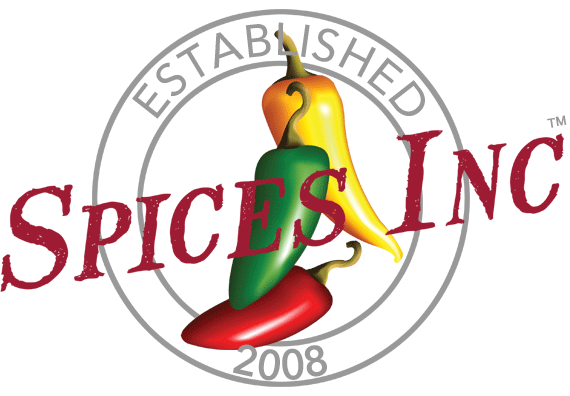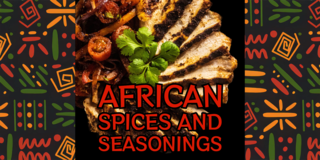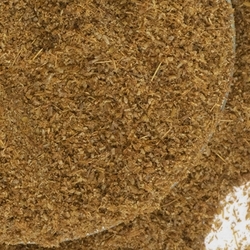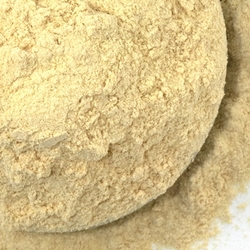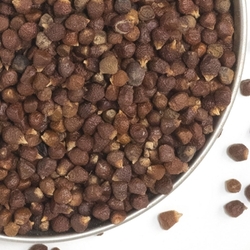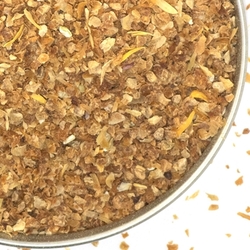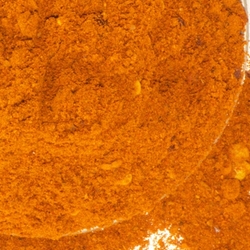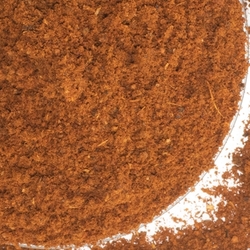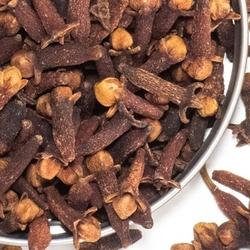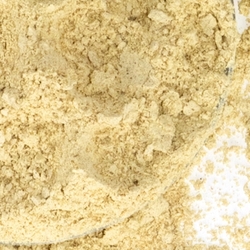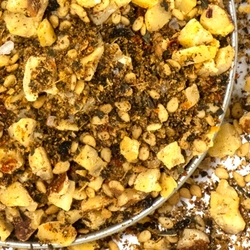African Spices and Seasonings
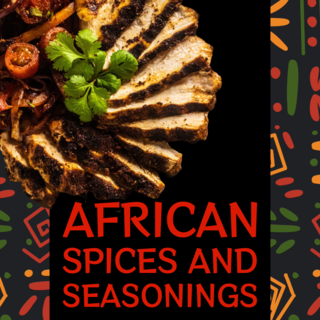
Africa is a huge continent. It is home to many distinct cuisines, all of which have some commonalities in which spices and seasonings they use. Food in Africa, much like in America, is both a personal experience and a social event. When you eat an African meal, be prepared to eat something that both soothes your hunger and your soul. There is always a little spice, whether from the chiles or the attitudes of the chefs who will be sure you have eaten your fill and enjoyed yourself.
We can break African cuisine up into five distinct regions: Northern Africa, Southern Africa, Central Africa, Western Africa and Eastern Africa. Each region has distinct preferences when it comes to flavors, meats used, and favorite dishes. Luckily, most regions use the same spices and seasoning blends, so they are more approachable for an international audience looking to give African cuisines a try.
African Spices
In Africa, spices are as integral to everyday life as water. Food is enjoyed deeply, with some meals being prepared for days before they are ready to be eaten. Each flavor is carefully selected to compliment or contrast the rest, with the final product coming out as a delicious meal the whole family can enjoy. Women are predominantly the food preppers, though men will chip in if a hand is needed.
- Grains of Paradise are sometimes called Alligator Pepper in Africa, and are used often in cooking, but also in important cultural ceremonies. You will find them used ritually in baby naming ceremonies and some other festivities that require people to gather in celebration.
- Garlic Powder is savory and used on meat-based dishes. The flavor of garlic is sometimes compared to onion, and the two are used in conjunction with one another or interchangeably.
- Ground Allspice is used a lot with meat.
- Cinnamon is used in sweets and on plantains. This spice may also be found in vegetable-based recipes, especially root vegetables. Sweet potatoes and cinnamon are a frequent combination. Teas, both warm and cold, are often accompanied by a healthy shake of cinnamon.
- Fenugreek is common in African cooking, especially stews that require a unique flavor. There is nothing that tastes exactly like this spice, so it is crucial to use it where it is called for.
- Cloves are used to flavor meats and stews, but they can also be used to flavor some vegetarian dishes.
- Cumin is not only a frequently used spice all over Africa, it also has roots in historical traditions. Beginning in the Middle Ages, it was believed that luck and a life full of joy would come to any bride and groom who carried cumin seeds with them all throughout their wedding ceremony.
- Paprika is used frequently with meat. Goat is a popular meat in African cooking, but chicken and paprika go together nicely, too.
- Lemon is a common flavor used to enhance the taste of many dishes. Lemon often takes salt's place in brightening up a dish, especially in North Africa.
- Chiles of any kind are crucial for African cooking. There are very few foods that don't have at least a little bit of chile, and if you are trying to cook an African based dish for the first time, you'll want to include chiles in your recipe.
- Tamarind is consumed daily and year-round by many rural West Africans, tamarind adds sour taste to drinks and meals.
African Seasonings
Many African seasonings are made at home, with care and consideration concerning what one specific family likes. African food is very personal, so most of these blends won't be found in markets. Usually, you'll find whole spices that must be ground down and used by the chef at home. This makes cooking even more personal and involved. The food culture in Africa is more home-based than fast food centric, unlike America where the average family will consume fast food at least once weekly. These blends are a testament to the value placed on food preparation in African culture.
- Berbere is used often in Ethiopian cooking. It is mostly used to flavor soups and stews, but it is delicious on cauliflower and kale, too. You can use this blend on vegetables based dishes as well.
- Ras el Hanout is used frequently in North African cooking. It is popular in rice, slow cooked stews, and on couscous or other pasta dishes.
- Dukkah is a particularly unique blend that is usually eaten on a flatbread. Sesame seeds, coriander, cumin, salt, pepper and some variety of nut are the only universal ingredients, and other than that the ingredients are personal to the preparer or family making it. It can sometimes include sugar, but it is mostly considered a savory blend. You may find dukkah on cheese as well. This blend is most popular in Egypt.
- Baharat is a popular spice blend in Northern Africa. There is no true recipe for this blend, as it usually varies from family to family and from region to region, but it does usually have black pepper, paprika, and cumin in it in some amount.
African food is some of the most interesting available on the planet. These spices and seasonings are a good start to understanding the different dimensions of flavor available to try in African cooking. From dishes like Doro Wat (Ethiopian Chicken) to Harissa Couscous, there is something for everyone to enjoy. Vegetarians and meat eaters alike can find an African food to fit their taste. You may be surprised to discover that African food is exactly what you have been missing in your diet if you give it a try.
